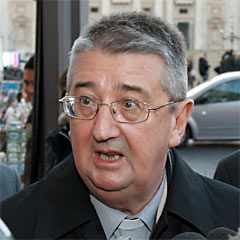Dublin archbishop condemns lack of accountability over abuse
By Cian Molloy, Catholic News Service DUBLIN, Ireland - The lack of willingness in the Catholic Church to begin “a painful process of renewal” in the wake of the clerical abuse scandals has left Dublin Archbishop Diarmuid Martin “disheartened and discouraged.”
DUBLIN, Ireland - The lack of willingness in the Catholic Church to begin “a painful process of renewal” in the wake of the clerical abuse scandals has left Dublin Archbishop Diarmuid Martin “disheartened and discouraged.”In a talk to the Knights of St. Columbanus on the future of the church in Ireland, the archbishop said the most obvious source of his discouragement was “the drip-by-drip, never-ending revelation about child abuse and the disastrous way it was handled.”
“There are still strong forces which would prefer that the truth did not emerge,” he said. “The truth will make us free, even when that truth is uncomfortable. There are signs of subconscious denial on the part of many about the extent of the abuse which occurred within the Church and how it was covered up. There are other signs of rejection of a sense of responsibility for what had happened. There are worrying signs that despite solid regulations and norms these are not being followed with the rigour required.”
In what some saw as a reference to the refusal by Bishop Martin Drennan of Galway and Kilmacduagh to resign, Martin said: “Renewal of the Church requires participation and responsible participation. I have spoken about the need for accountability regarding the scandal of sexual abuse. I am struck by the level of disassociation by people from any sense of responsibility.”
Drennan was one of four former Dublin auxiliary bishops named in a November report by an independent commission that criticized the way sexual abuse cases were handled by bishops in the Dublin archdiocese. Earlier in 2009, the independent Commission to Inquire Into Child Abuse revealed that, in some government institutions run by religious orders, abuse of children had been endemic. The commission heard from more than 10,000 former residents of the homes who alleged abuse.
Martin also said the Irish Church needed to carefully look at priestly formation.
“I am working on plans to ensure that for the future in Dublin our seminarians, our prospective deacons and our trainee lay pastoral workers ... will share some sections of their studies together, in order to create a better culture of collaborative ministry. The narrow culture of clericalism has to be eliminated,” he said.
Please support The Catholic Register
Unlike many media companies, The Catholic Register has never charged readers for access to the news and information on our website. We want to keep our award-winning journalism as widely available as possible. But we need your help.
For more than 125 years, The Register has been a trusted source of faith-based journalism. By making even a small donation you help ensure our future as an important voice in the Catholic Church. If you support the mission of Catholic journalism, please donate today. Thank you.
DONATE